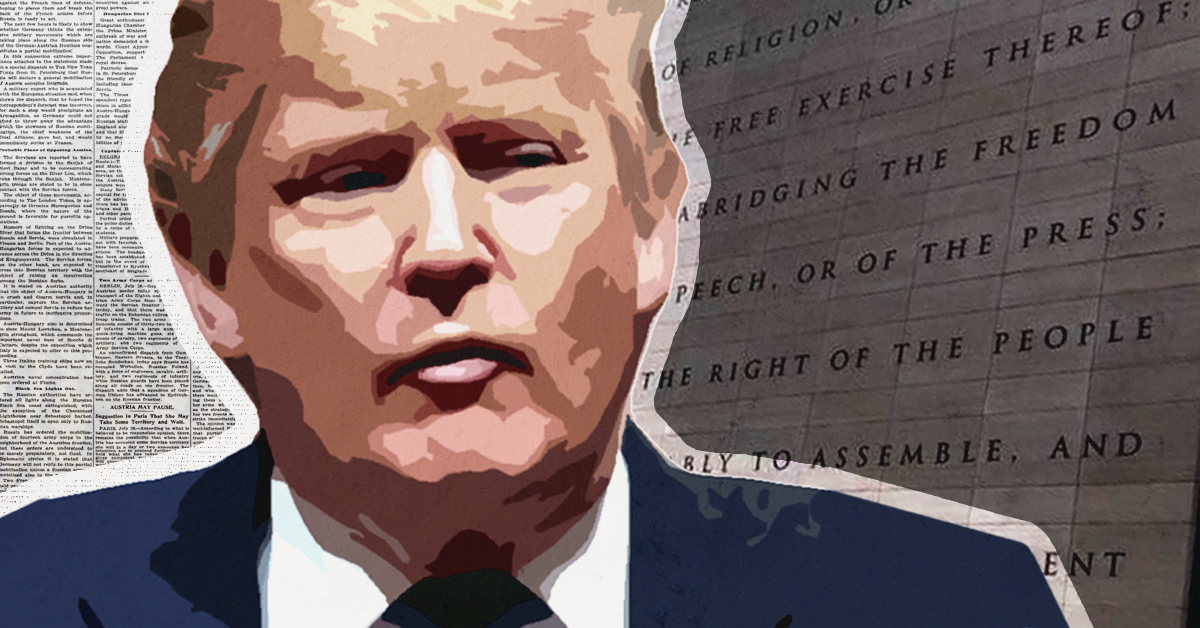
The Washington Post editorial board called President Donald Trump’s attacks against the media “a gift to tyrants everywhere,” highlighting the repressive regimes around the world that are adopting his tactics and picking up on his cue “that the United States will no longer champion freedom of the press and expression.”
Trump’s war against the press was a feature of his presidential campaign, and it continued through the transition period and into his presidency. During the campaign he promised to “open up our libel laws,” threatened to retaliate against the media using government agencies, blacklisted various outlets and reporters, and launched personal and nasty attacks against individual media figures. And since his inauguration, he and members of his administration have been openly contemptuous of the news media and have made a concerted effort to delegitimize the press. They have declared a “running war with the media,” called the media “the opposition party,” accused the media of intentionally lying, and labeled legitimate reporting that they don’t like “fake news.” Syrian President Bashar al-Assad was one of the first dictators to adopt Trump’s tactic of dismissing credible reporting by calling it “fake news.”
The Post’s editorial pointed out the “ripple effect” Trump’s attacks have had, writing that repressive leaders have “heard the president say exactly what they have been saying about nettlesome journalists who expose human rights abuses, corruption and rigged elections” and pointing to examples from Cambodia, China, and Russia. A government spokesperson in Cambodia, noting that the White House barred some outlets from a press briefing, issued a warning to two news outlets whose coverage they saw as threatening that they “must respect the state's power”; China’s Communist Party-run paper called a human rights lawyer’s allegation that he was tortured “fake news”; and Russia’s Foreign Ministry “has set up a new section of its website for ‘fake news’” and branded a New York Times story as fake. The editorial concluded that Trump “appears to see the news media in strictly promotional terms, not as a mechanism of democracy to probe and criticize,” noting that “his behavior has global consequences.” From the March 7 editorial:
WHEN PRESIDENT TRUMP called the U.S. news media “the enemy of the American People” and brandished the moniker “fake news” at reports he didn’t like, tyrants everywhere perked up. They heard the president say exactly what they have been saying about nettlesome journalists who expose human rights abuses, corruption and rigged elections. Mr. Trump’s remarks have a ripple effect overseas, signaling that the United States will no longer champion freedom of the press and expression. This will inevitably lead to more repression.
[...]
In Russia, where press freedom has been corralled into a small space under President Vladimir Putin and the dark arts of propaganda and disinformation are well practiced, the Foreign Ministry has set up a new section of its website for “fake news,” with a big red stamp of “FAKE” for reports that it does not like. Among those so branded was a New York Times article describing the new practice.
Mr. Trump has a personally contradictory relationship with the news media. He has long hungered for favorable coverage. But he appears to see the news media in strictly promotional terms, not as a mechanism of democracy to probe and criticize.
His behavior has global consequences. The press would not be free in Cambodia, China or Russia if a different U.S. president had been elected. But the United States has a long tradition of speaking out against crackdowns on the news media, and sometimes those interventions make a difference. Secretary of State Rex Tillerson says that “American foreign policy must promote our core values of freedom, democracy and stability.” Does the president agree?